Supplements for Chronic Kidney Disease
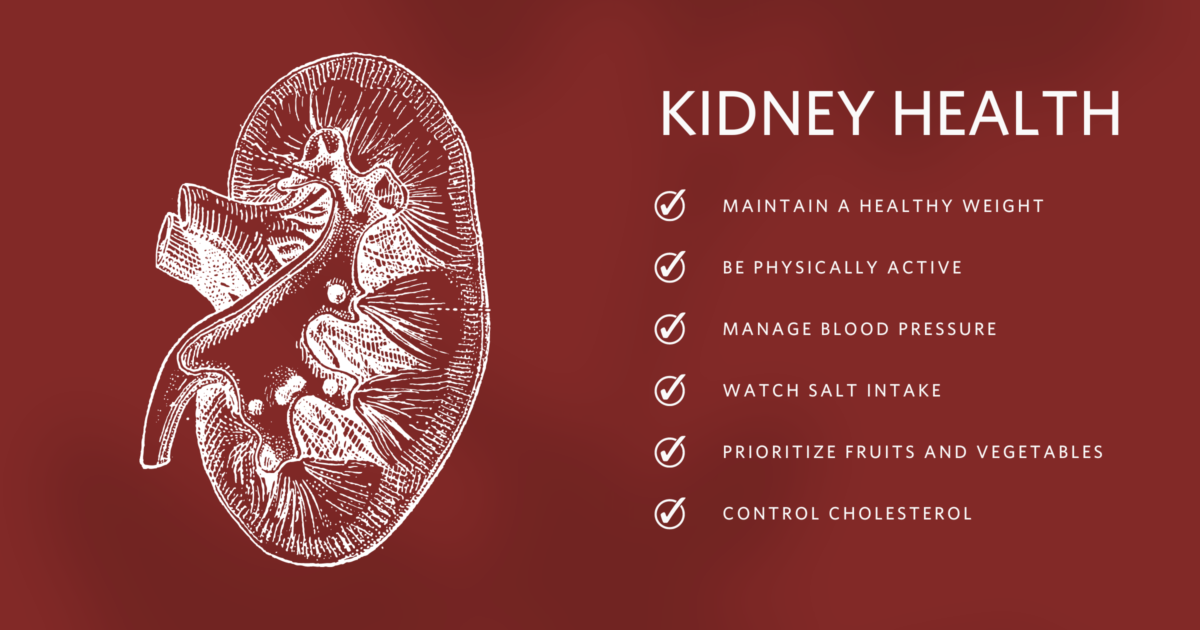
Your kidneys play a vital role in keeping your body in equilibrium. An easily forgotten system in the body, the urinary system filters blood and ensures waste exits the body. More specifically, the kidneys remove excess water, toxins and waste from the bloodstream, help hormones produce red blood cells and turn vitamin D into its active form making it readily available in the body.
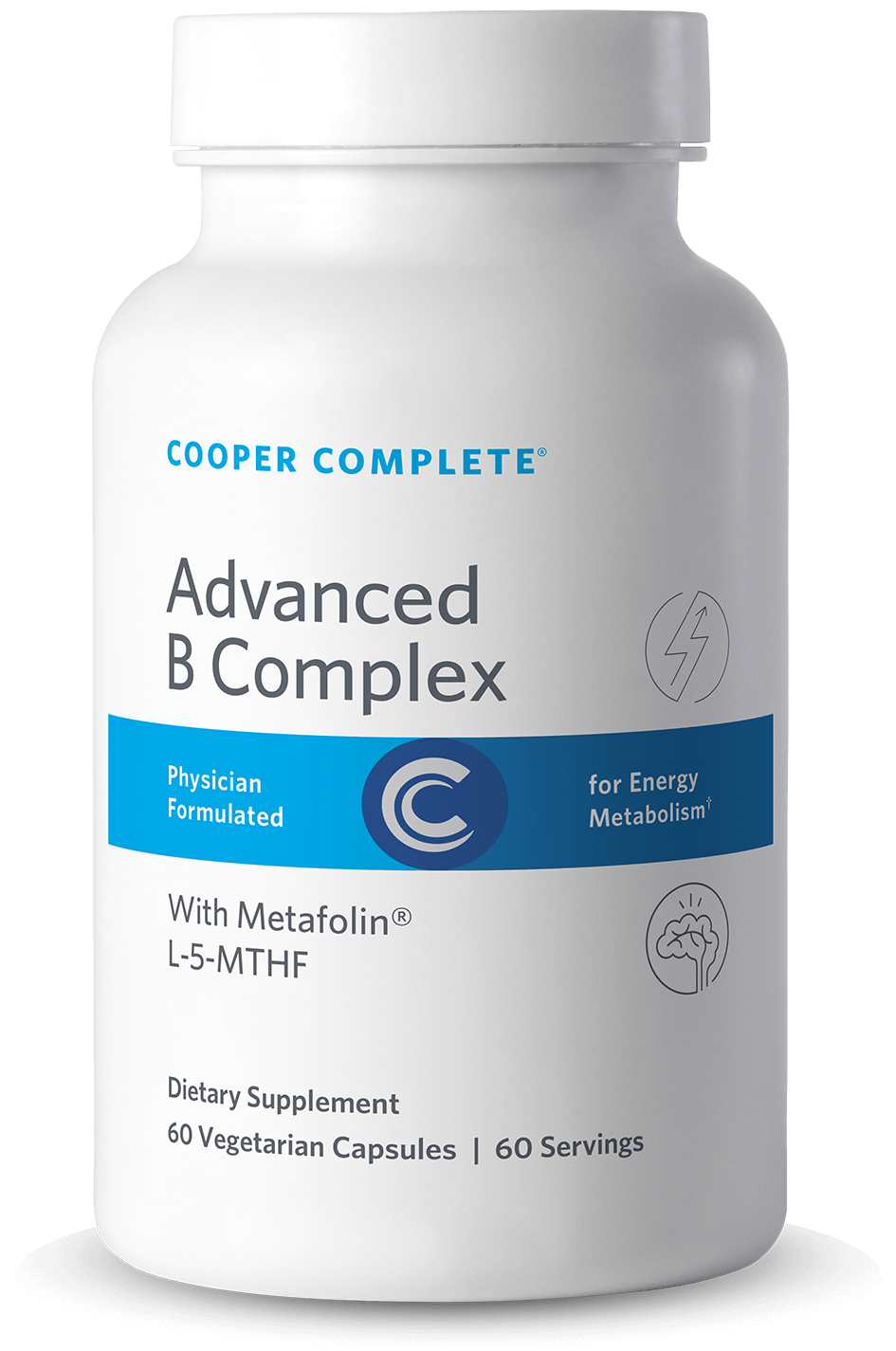
Advanced B Complex Supplement
Advanced Vitamin B Complex supplement contains the activated, methylated, most easily absorbable forms of eight essential B vitamins, including biotin and folate, to support cellular energy production and immune, cardiovascular, and neurological health.†
$23.68 Add to cartWhen your kidneys stop working properly, you’re diagnosed with kidney disease. Acute kidney disease develops suddenly and results in a rapid loss of kidney function. It is typically due to an event such as dehydration, blood loss or a urinary tract obstruction. Chronic kidney disease (CKD) occurs when your kidney function slowly worsens over time—it is gradual—and is typically caused by a long-term condition such as diabetes. When toxic waste and extra fluid accumulate in the body due to CKD, high blood pressure, heart disease, stroke, kidney failure and early death may occur. While there is no cure for CKD, identifying and managing underlying conditions and symptoms can help. Without management, kidney failure can result in the need for dialysis (artificial filtering) or a life-altering kidney transplant.
CKD Risk Factors and Symptoms
More than one in seven—15% of U.S. adults or 37 million people—suffer from CKD. CKD is most common in those 65 years and older, women and non-Hispanic, black adults. The most common causes of CKD are high blood pressure and diabetes. Other risk factors include:
- Heart disease
- Obesity
- Family history of kidney disease
- Past damage to the kidneys
- Older age
- Smoking and tobacco use
CKD is progressive, meaning it worsens over time. The five stages of chronic kidney disease:
Chronic Kidney Disease Stages |
||
|---|---|---|
| Stage | eGFR* | What it Means |
| Stage 1 | 90 and higher | – Mild kidney damage – Kidneys still work well |
| Stage 2 | 60-89 | – Mild kidney damage – Kidneys still work well |
| Stage 3a | 45-59 | – Mild to moderate kidney damage – Kidneys don’t work as well as they should |
| Stage 3b | 30-44 | – Moderate to severe damage – Kidneys don’t work as well as they should |
| Stage 4 | 15-29 | – Severe kidney damage – Kidneys are close to not working at all |
| Stage 5 | Less than 15 | – Most severe kidney damage – Kidneys are very close to not working at all or have failed |
*Glomerular filtration rate (eGFR): number based on the amount of creatinine (waste) found in the blood.
In stage four of CKD, your kidneys no longer work as well as they should to filter waste out of your blood which can build up and cause high blood pressure, bone disease and heart disease. This is the final stage before kidney failure.
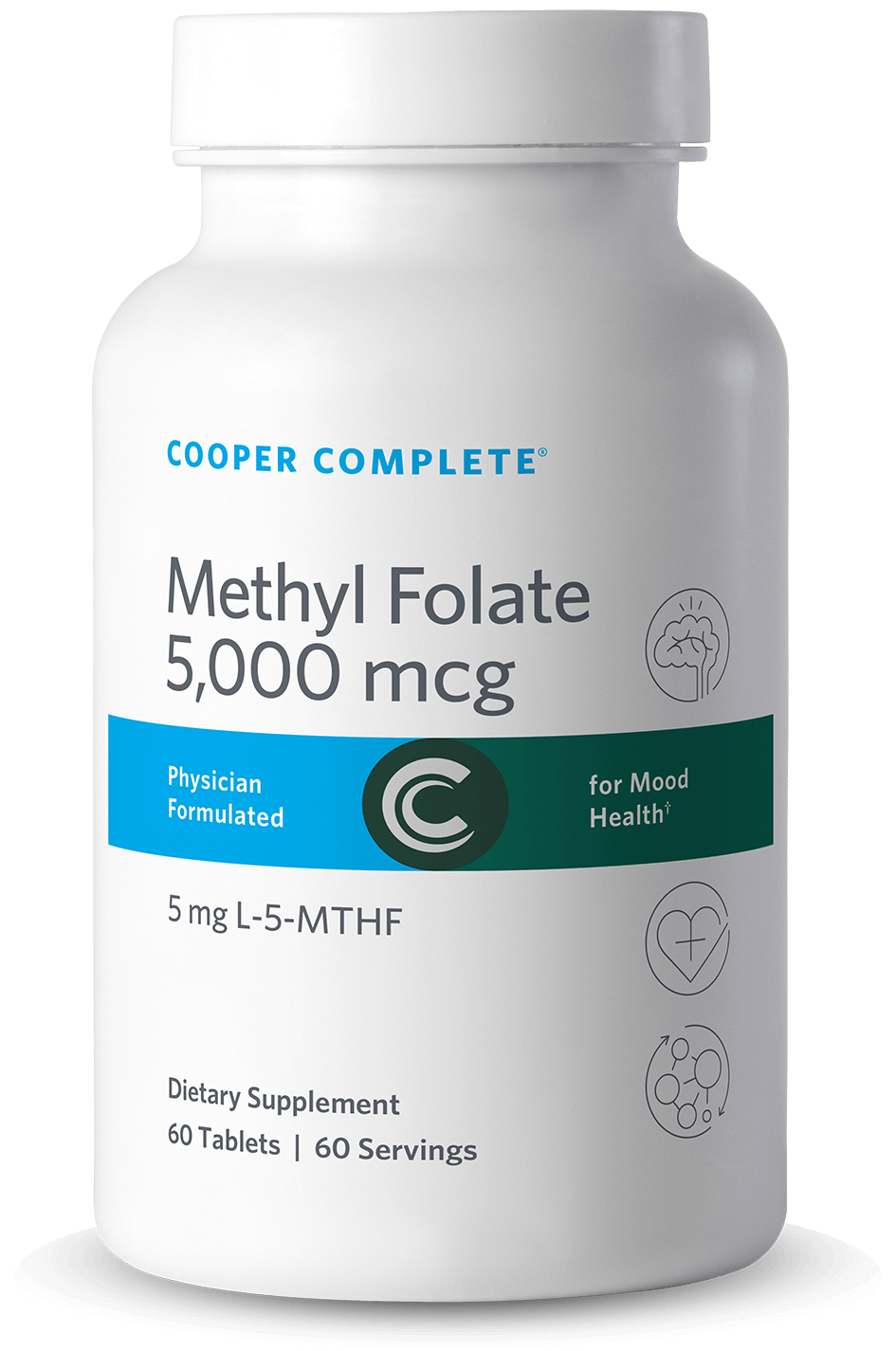
Methyl Folate Supplement 5000 mcg (5 mg)
Cooper Complete® Methyl Folate 5000 mcg (5 mg) supplement with L-5-MTHF methylated form of folate that supports heart, brain, mood, and overall health.†
$62.68 Add to cartIn the early stages of CKD, symptoms are typically not noticeable, and many individuals do not realize they have it. Healthy kidneys have a greater capacity to perform their job than is necessary. That is why you can donate one kidney and remain healthy. As the disease progresses, symptoms may include:
- Swelling (edema) in the legs, feet, ankles and less often, the hands and face
- Chest pain
- Dry skin
- Itching or numbness
- Excessive tiredness or sleep issues
- Headaches
- Increased or decreased urination
- Loss of appetite
- Muscle Cramps
- Nausea
- Shortness of breath
- Trouble concentrating
- Vomiting
- Weight loss
Those with CKD can also develop anemia, bone disease and malnutrition. When your kidneys are damaged, they produce less erythropoietin (EPO), a hormone that signals your bone marrow—the spongy tissue inside most of your bones—to make red blood cells. With less EPO, your body makes fewer red blood cells, and less oxygen is delivered to your organs and tissues, causing anemia and bone disease. Anemia also puts individuals at a higher risk of developing cardiovascular disease. In addition, those with CKD are prone to malnutrition due to a change in diet and loss of nutrients through dialysis.
Those with risk factors of CKD should be evaluated routinely since there are typically no symptoms in stages one through three. Routine blood work and an annual exam with your physician—regardless of risk factors—should be done. Blood tests measure creatinine levels which are used to calculate eGFR or the amount of waste your kidneys should be able to filter per minute. Additional tests to diagnose CKD include a urinalysis, ultrasound and CT scan of the kidneys.
Kidney Disease Prevention and Management
Those with CKD and those at risk of developing it can make lifestyle changes to protect their kidneys. Preventing chronic kidney disease starts with your lifestyle. Managing risk factors such as high blood pressure and blood sugar levels can reduce your risk of developing CKD by maintaining a healthy body weight, eating a balanced diet and exercising regularly. A registered dietitian nutritionist can help create an eating plan right for you.
Reducing protein, sodium and potassium may be needed to help slow the progression of CKD. This can make it challenging to get all the vitamins and minerals your body requires to function. In addition, dialysis can cause some of the vitamins and minerals you consume through food to be lost. Supplements may prove beneficial in helping those with CKD obtain the nutrients needed. Studies on supplements for kidney disease are emerging and your health care professional can help direct you on which vitamins and minerals may be right for you.
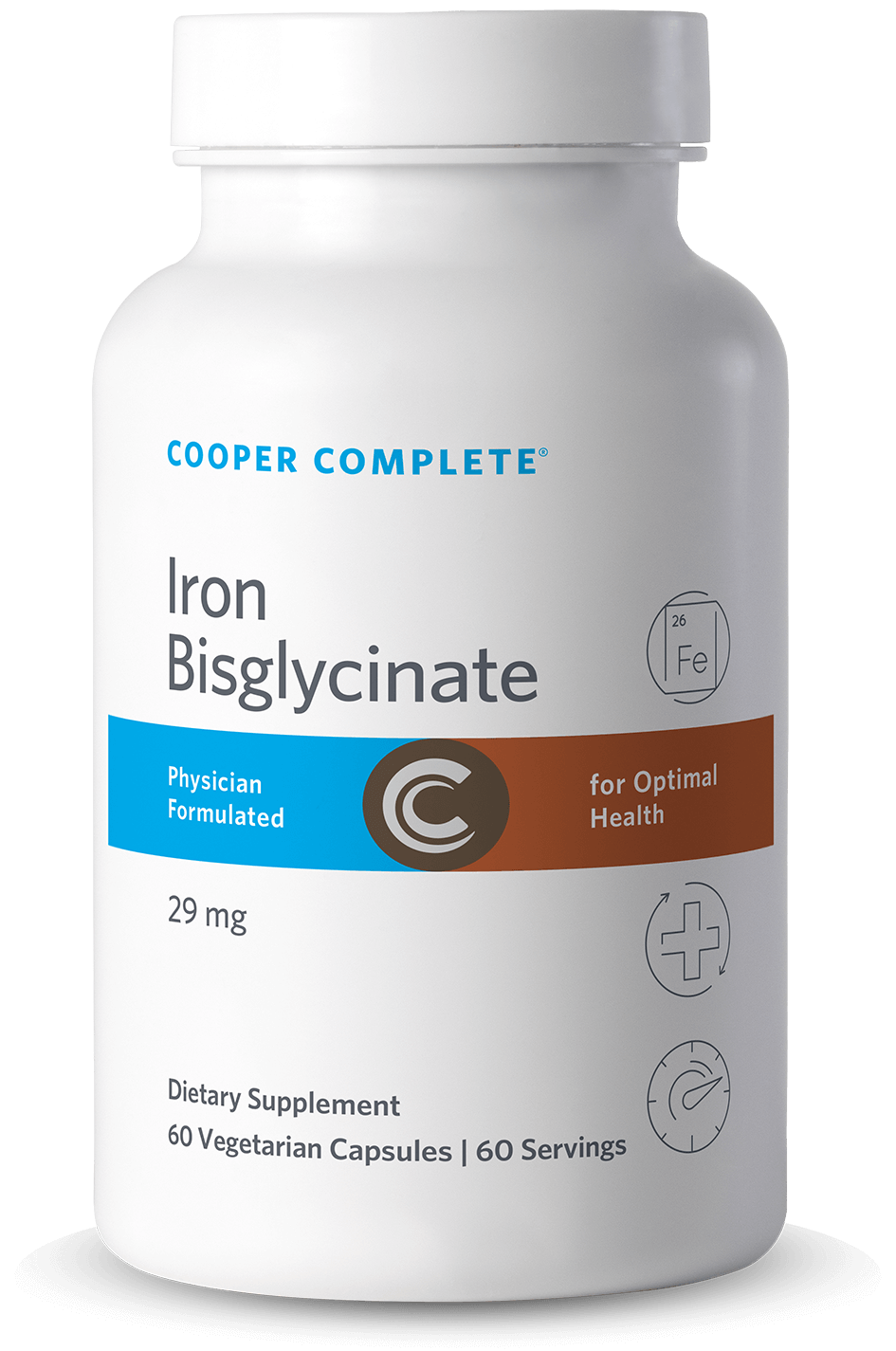
Iron Bisglycinate Supplement 29 mg
Iron Bisglycinate Supplement contains 29 mg of gentle and highly absorbable Ferrochel® (a patented chelated iron in the form of iron bisglycinate) intentionally designed to avoid gastric upset or constipation.
$16.98 Add to cartSupplements for Chronic Kidney Disease, B Complex Vitamins and Iron for Anemia
Anemia occurs when your body does not produce enough red blood cells. Without a supply of red blood cells, your tissues and organs do not receive the oxygen needed to function properly. Anemia is a common complication of CKD with one in seven diagnosed with CKD also suffering from anemia. Additionally, as the disease progresses, most individuals who have kidney failure also have anemia.
The eight B vitamins each play a different role in the body. An important function of vitamins B6, B12 and folic acid is they work together with iron to prevent anemia. B vitamins also help turn the food we eat into energy for the body. Vitamin B12 and folate help produce healthy blood cells needed throughout the body. The daily recommendation of folate for those with CKD is 1 mg a day, regardless if they are on dialysis or not.
Cooper Complete nutritional supplements offers Advanced B Complex which contains the most easily absorbed forms of all B vitamins. Cooper Complete Iron Bisglycinate is in an easy-to-digest form to help support healthy circulation, immune health and energy production.
Active Vitamin D and Calcium for Bone Health
Vitamin D is used by the body to help absorb calcium and phosphorus and deposit these minerals in bones and teeth—keeping them strong and healthy. Your kidneys transform the vitamin D you consume into a usable and active form. With CKD, your body’s ability to convert vitamin D to its active form diminishes. If on dialysis, injectable vitamin D may be used as a supplement. Vitamin D3 is more readily absorbed by the body than other forms and can be found in three standalone forms from Cooper Complete.
Calcium is another supplement that helps keep your bones strong. Calcium can be found in foods such as dairy, soybeans, enriched grains and dark leafy greens such as spinach, kale, turnips and collard greens. Cooper Complete’s Calcium Citrate is a viable alternative if your diet does not provide enough calcium.
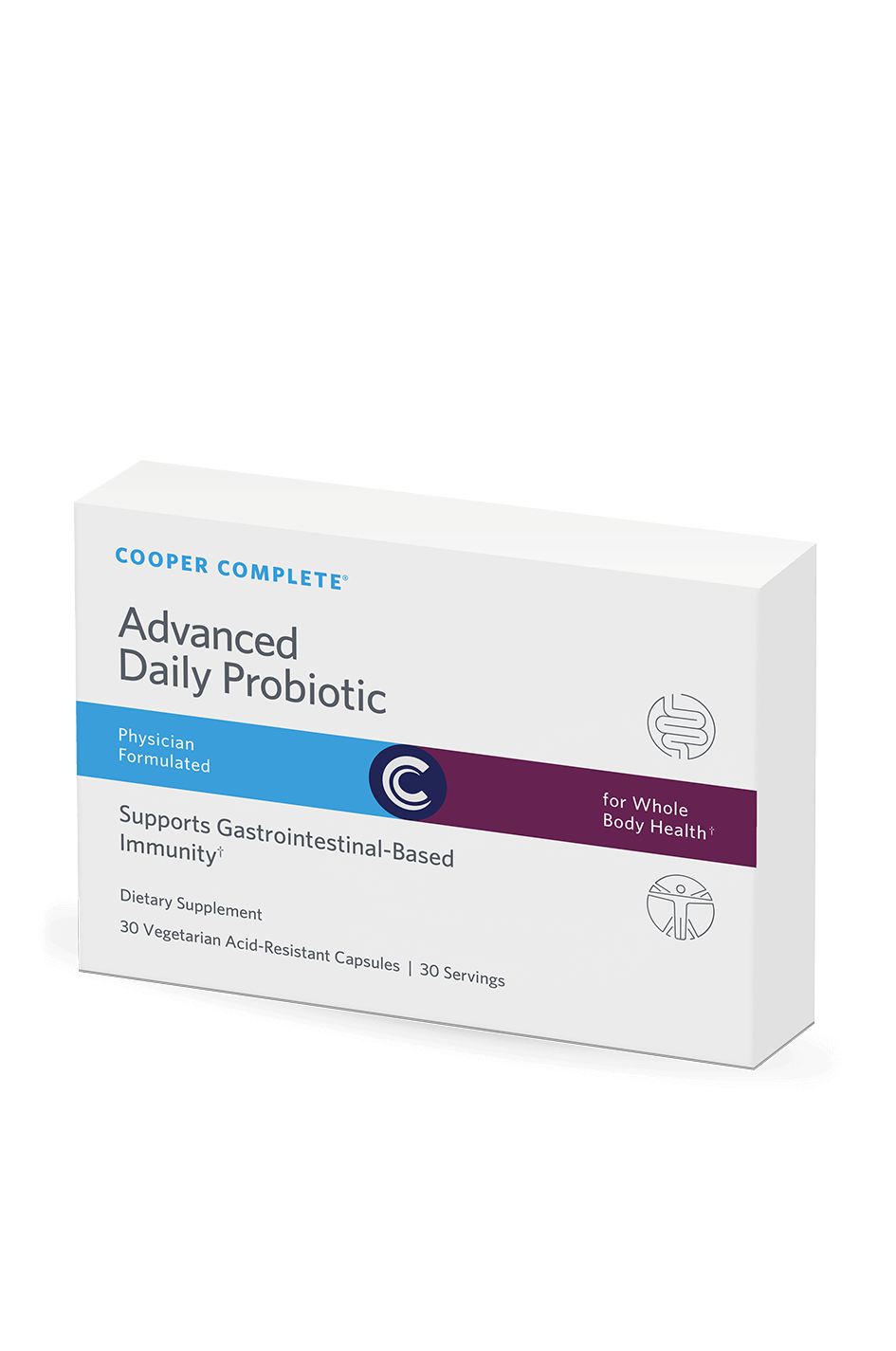
Advanced Daily Probiotic Supplement
Advanced Daily Probiotic supplement contains a proprietary blend of 4 strains and 35 billion CFU probiotics to support gut microflora and immune health.†
$46.98 Add to cartThe Gut-Kidney Connection: Probiotics and Fiber
The gut microbiome is composed of trillions of bacteria that aid in the healthy function of the digestive system. Unfortunately, those diagnosed with CKD see an increased concentration of urea—gut-derived toxins—which can accelerate the CKD process. Eating a healthy diet, including fiber and probiotics, can help reduce the level of toxins in the blood and kidneys. But with CKD, it can be hard to consume adequate levels of nutrients.
Studies show supplementation with a probiotic can positively affect the gut microbiota of patients with CKD. It is important to note many strains of probiotics are available, and choosing the correct one may help maintain and improve your gut health. Talk with your physician to see if a probiotic supplement for your chronic kidney disease is right for you. Cooper Complete offers an Advanced Daily Probiotic supplement provides 4 strains and 35 billion CFU prebiotics to support healthy gut microflora and immune function.
Fiber can be found in many food groups including fruits and vegetables, beans, chickpeas and more but is often hard to digest and inadequate due to dietary restrictions for those with CKD. Fiber can aid in reducing inflammation, constipation and uremic toxins found in the blood and improving gut health. Ensuring you are consuming an adequate amount of soluble and insoluble fibers can help reduce uremic toxins, improve overall gut function and slow down CKD. Ask your doctor if a microbiome fiber supplement such as Cooper Complete’s may be right for you.
Vitamins and Supplements to Avoid
While some vitamins, minerals and supplements for chronic kidney disease are beneficial, there are other vitamins and minerals you may need to avoid if diagnosed with CKD. Vitamins such as A, E and K—fat-soluble vitamins—can build up and cause dizziness, nausea and even death if too much is consumed. Although small doses of vitamin C may be okay, too much can cause a buildup of oxalate—a compound naturally occurring in some foods—preventing your body from absorbing nutrients.
Although there is no cure for CKD, ensuring an adequate diet with essential nutrients can help slow the process and reduce symptoms. Supplements for chronic kidney disease such as the ones mentioned above may help improve symptoms and quality of life. Your physician understands your health best, so it is important to talk to them before adding any supplement to your routine.
